@Wittmann Unfortunately It is too far from where I Live. We have a group on FaceBook called the London Fighters and Play every now and then. If it happens for you to find yourself in London join us for the fight. Next Global Game is set for the 24th of November 2019. Regards.
Bob_A_Mickelson's AAG40 National Production/Objectives and Setup Charts
-
im gonna stick that chart to a thin metal plate and stick it to the wall,and glue magnits to my roundels,to save space on the table
Brilliant!
-
Update: August 31, 2010
My basic charts for AAG40 are complete. Below you will see the low resolution screenshots of the AAG40’s National Production / National Objectives / Weapon’s Development Chart, Diplomacy / Nation Specific Rules Charts and Setup Charts for each power. As always,please report any errors or inconsistencies so I can fix them. Enjoy.
Download the High-Resolution version of these charts here:
http://www.mediafire.com/?6e1yyufks954ap7
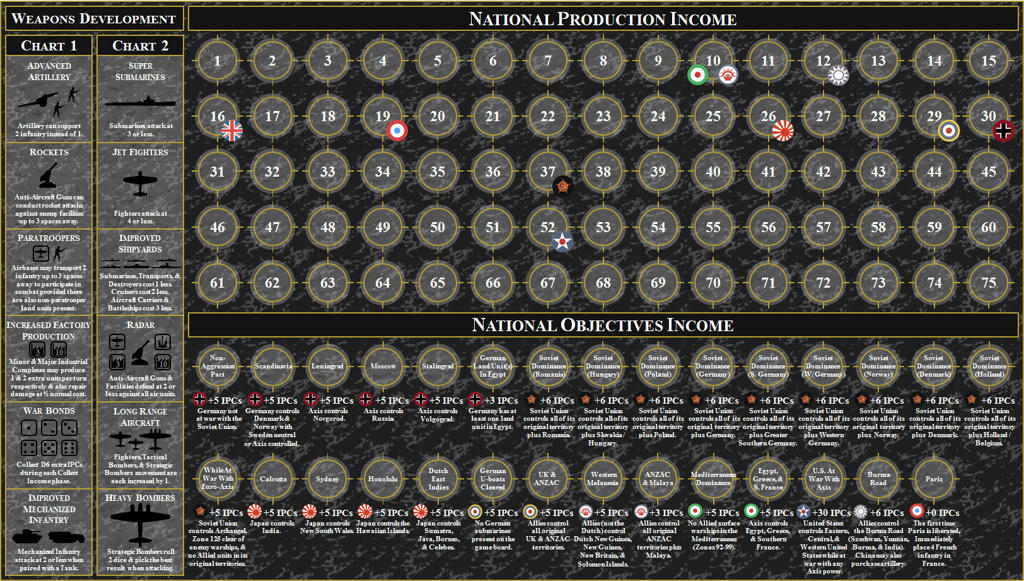
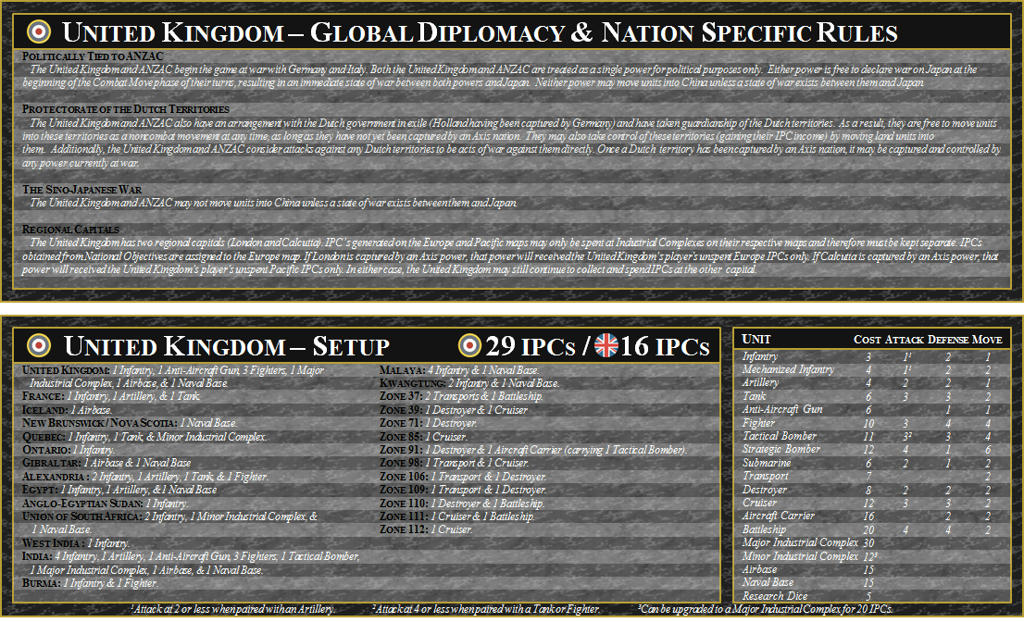
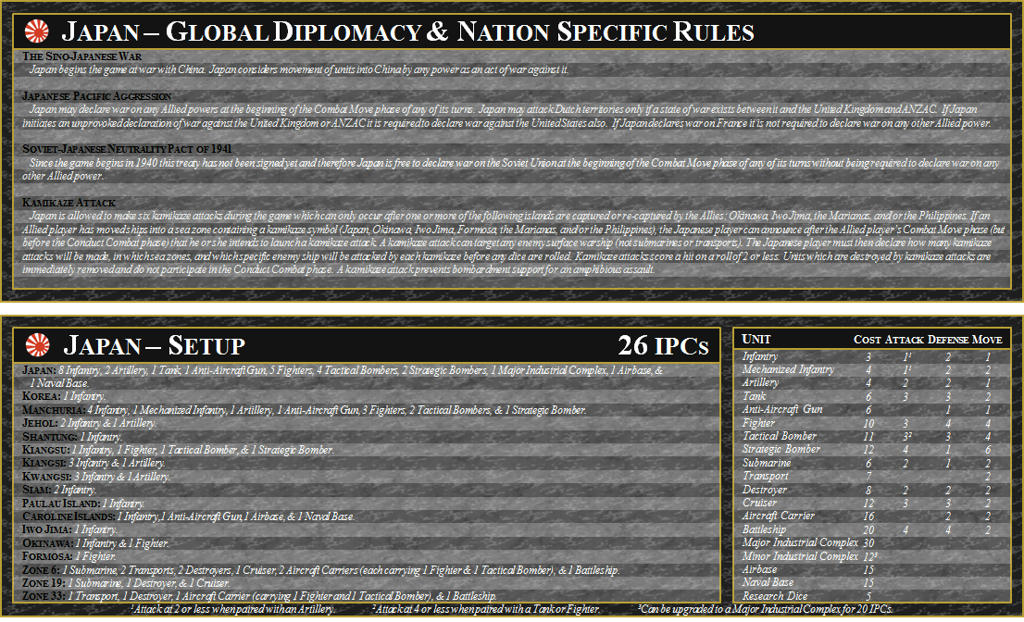
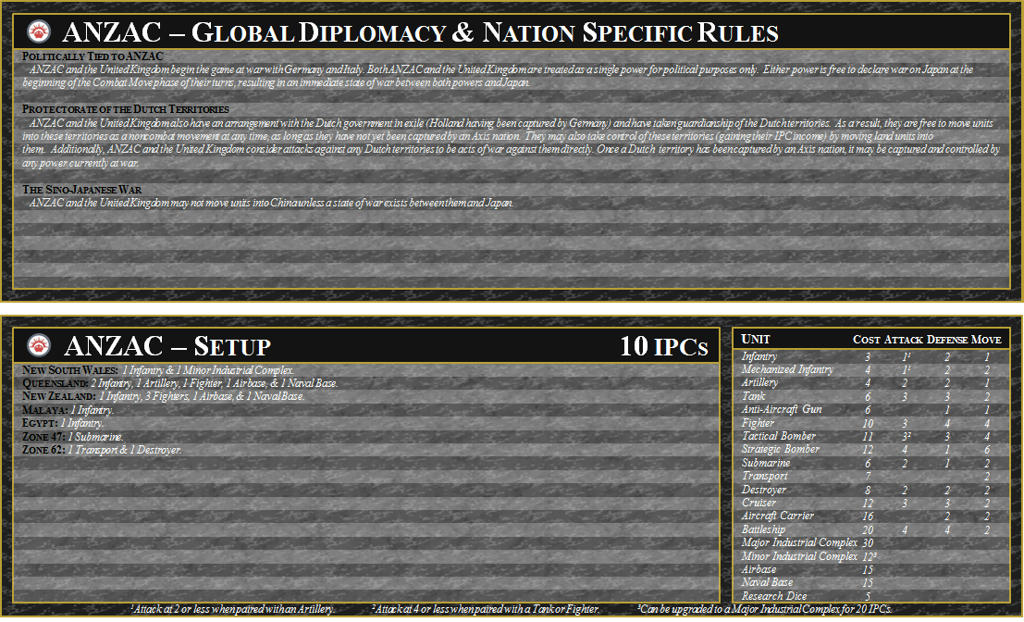

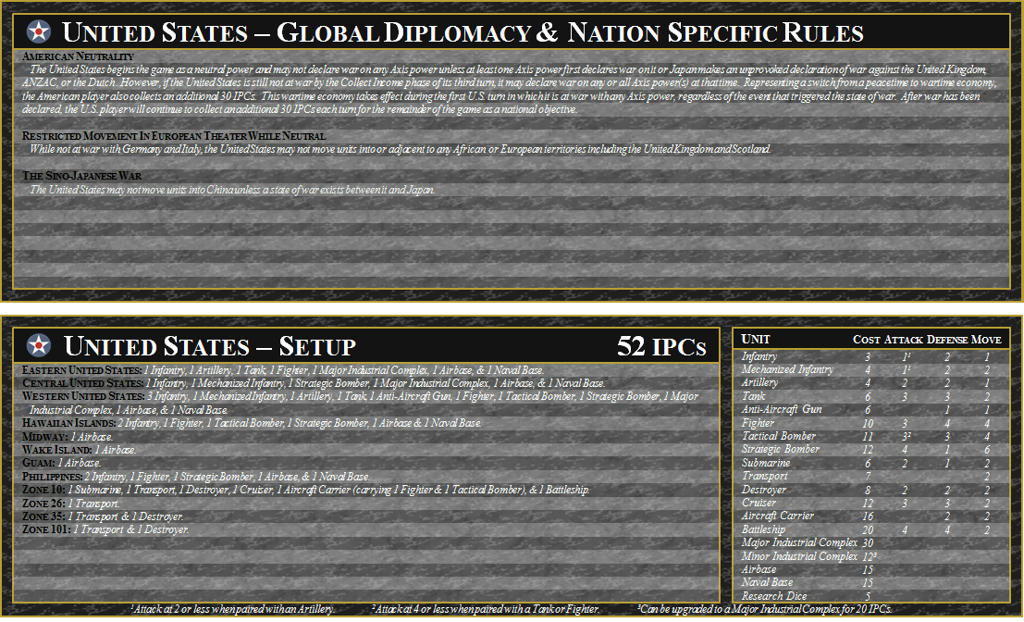
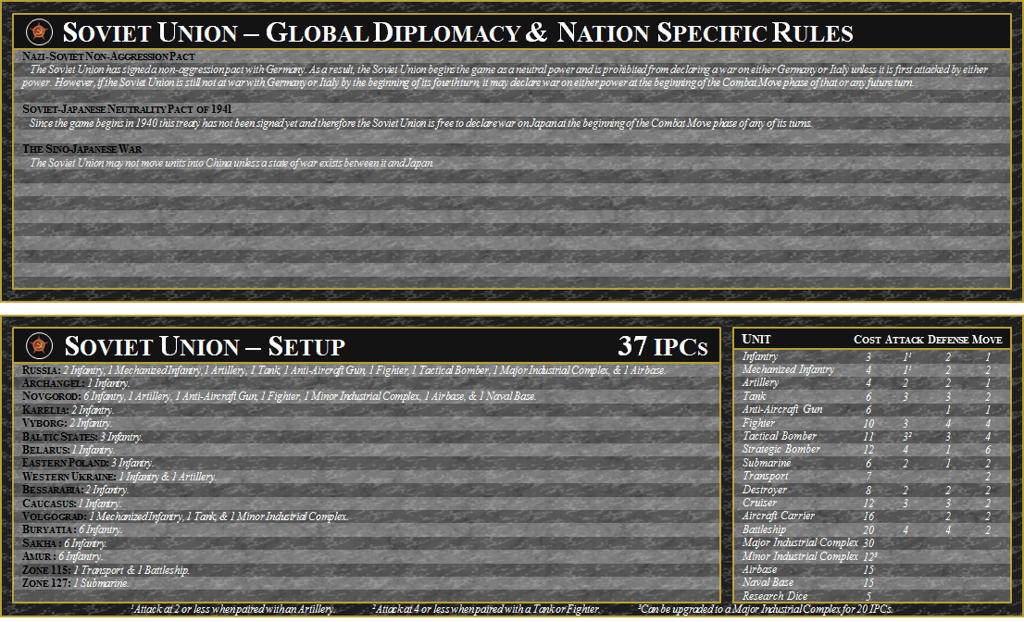

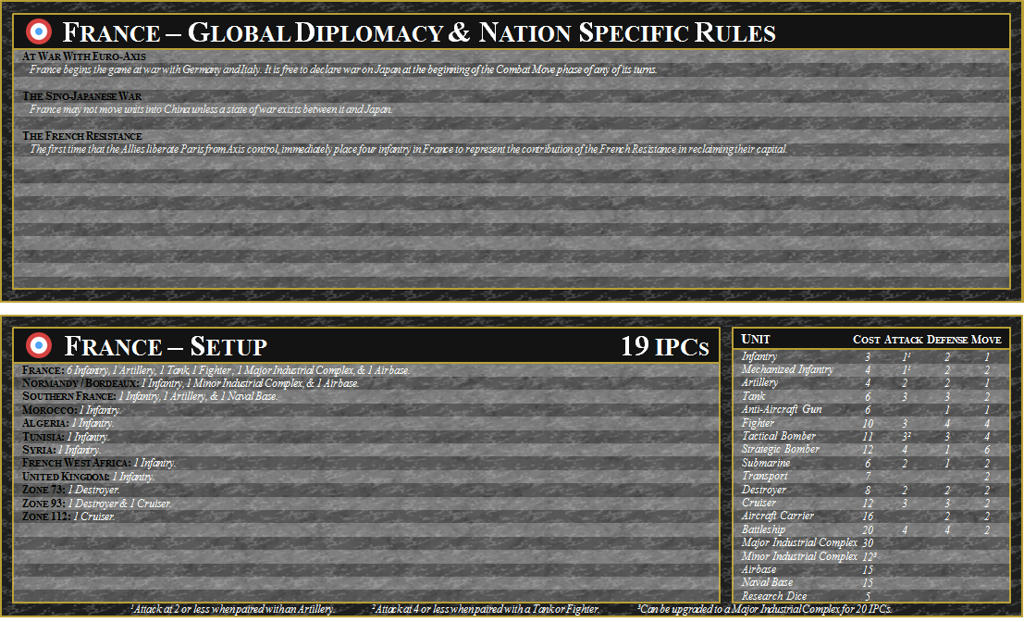
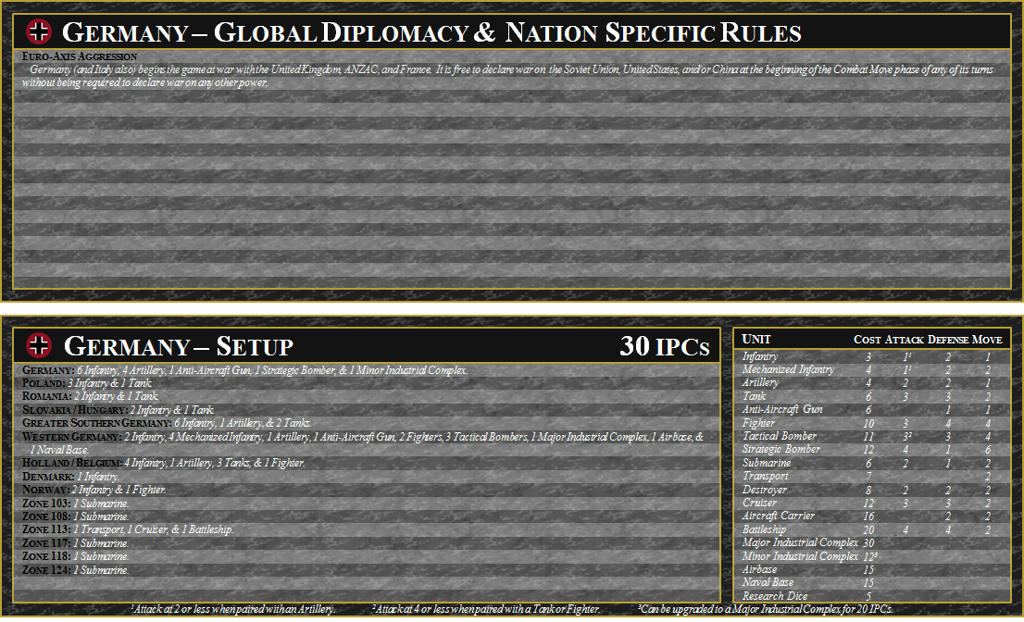
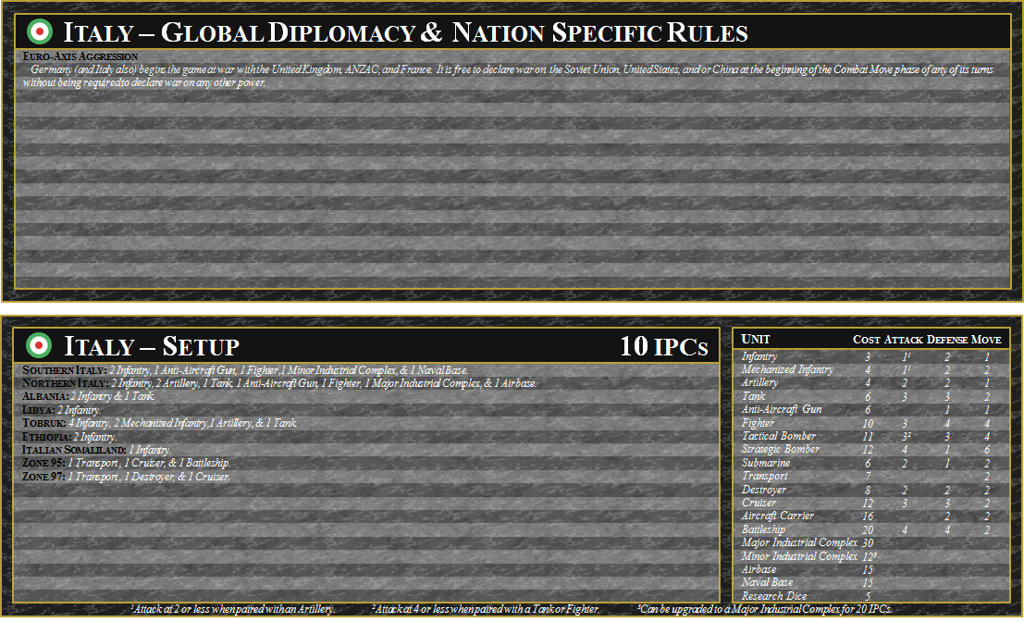
I don’t expect that I will get around to Task Force or Battleboard any time soon as I still have AAE40 Charts to finish plus a potential setup change from Larry Harris.
-
Can you please change the italic white font? Its really hard to read. If you can use a Gothic heavy font its easier to read. I say keep the fonts in bold in white. Its hard to use these. Just my 2 cents.
-
@Imperious:
Can you please change the italic white font? Its really hard to read. If you can use a Gothic heavy font its easier to read. I say keep the fonts in bold in white. Its hard to use these. Just my 2 cents.
Yeah, when I print it in black and white, I can’t see the setup
-
Yes, something more readable, please.
-
larger fonts and if you got dark background its not a good idea to use black fonts.
-
Bob they are great as usual! Look really professional :-)
-
These look great. Thanks for your effort!
-
this is just awesome…. thank you for your effert. only thing i am missing is that the national marker only reaches 72 ipc’s.
-
@Imperious:
Can you please change the italic white font? Its really hard to read. If you can use a Gothic heavy font its easier to read. I say keep the fonts in bold in white. Its hard to use these. Just my 2 cents.
Yeah, when I print it in black and white, I can’t see the setup
I agree with the font change request. Thanks. great work
-
I thought it was written such that if Japan makes an unprovoked attack against the UK/Anzac, it does NOT imply an attack or declaration of war against the US (such that it is possible to attack a seazone containing any combination, but only fight against the Brits and Aussies). It just means that the US is free to declare war on Japan the next turn in response to the unprovoked attack on their allies in the pacific.
-
I thought it was written such that if Japan makes an unprovoked attack against the UK/Anzac, it does NOT imply an attack or declaration of war against the US (such that it is possible to attack a seazone containing any combination, but only fight against the Brits and Aussies). It just means that the US is free to declare war on Japan the next turn in response to the unprovoked attack on their allies in the pacific.
That might be true now in the Global Rules but wasn’t in Pacific 40. I’ll look into it.
I agree with the font change request. Thanks. great work
Changing to a bigger/clearer font makes it difficult to fit everything on the page. I tried to keep everything the same style as my AAP40 charts. As for fonts, what do you guys suggest? (Remember it must be clear, small, and look good within the established style.)
-
Changing to a bigger/clearer font makes it difficult to fit everything on the page. I tried to keep everything the same style as my AAP40 charts. As for fonts, what do you guys suggest? (Remember it must be clear, small, and look good within the established style.)
Thats easy stretch the background and make it larger enough so the font will fit.
The whole idea is that it should be as readable as possible. The OOB setup charts are not so good either.
If perhaps you have the file blank i know i can do it in CS3.
-
@Imperious:
Changing to a bigger/clearer font makes it difficult to fit everything on the page. I tried to keep everything the same style as my AAP40 charts. As for fonts, what do you guys suggest? (Remember it must be clear, small, and look good within the established style.)
Thats easy stretch the background and make it larger enough so the font will fit.
The whole idea is that it should be as readable as possible. The OOB setup charts are not so good either.
If perhaps you have the file blank i know i can do it in CS3.
The OOB setup charts are easy to read
-
That might be true now in the Global Rules but wasn’t in Pacific 40. I’ll look into it.
Based on the Errata for Pac40, that’s incorrect. The current wording from the errata states: The United States may not declare war on Japan unless Japan first declares war on it or makes an unprovoked declaration of war against the United Kingdom or ANZAC.
There is an implication of non exclusivity because if Japan was required to declare war on the US there wouldn’t be an “or makes an unprovoked declaration of war against the United Kingdom or ANZAC.”
**Special Comments and Clarifications Related to Neutral Powers
In the event that a power at war attacks a sea zone containing units belonging to a power with which it is already at war and units belonging to a power with which it is not at war, the latter power’s units are ignored. Those units will not participate in the battle in any way, and a state of war with that power will not result.**
And per the FAQ posts:
However, if Japan attacks the Dutch on J1, then they are at war with the Dutch, UK/anzac and the US immediately and really no declaration of war is needed because of an unprovoked declaration of war by Japan.
Not exactly. If Japan declares war on UK/ANZAC on J1, war with the US does not immediately result. It does, however, give the US the ability to declare war on Japan on any subsequent turn.
Great, thank you. So even if Japan makes an unprovoked declaration of war against UK/ANZAC while it is not yet at war the US, then it is not subject to convoy raid by the US at the end of that turn.
Correct.
I believe Pac40 rules have always stated that it’s up to Japan on which power to declare war on, and their hand is never forced to declare war on both UK/ANZAC and the US and they can choose one over the other (though in most instances they probably declare war on both).
-
I have a suggestion for the charts legibility.
Increase the tracking all around to make it easier to read.
For the white letters; add a black Drop shadow with this setting:
Opacity: 100%
Distance: 0.0075 in
Size: 0
Play around with the setting of the drop shadow but I think this way you don’t have to increase the font size and it will separate it from the background more and add some weight to the letters.
Try it out I think it might work.
I’m a graphic designer and have a lot of experience with Adobe software.
If you need any help I’ll be more than willing to dedicate my time and knowledge to making your charts look incredible, I mean, more incredible they look great. :-D
-
One last thing, making the files PDFs will make them much sharper. Vectorized files are better than rasterized ones when it comes to type.
-
I’m not sure i can change those settings. I created these charts in powerpoint not photoshop.
-
I’m not sure i can change those settings. I created these charts in powerpoint not photoshop.
It’s a matter of exporting as pdf vs exporting as a jpg. I believe powerpoint doesn’t rasterize fonts until you export it, so if you have the option to save as a pdf, it should be possible for anyone to enlarge them.
But only if you have the option to save as a pdf. Which is often a function provided by other programs, such as Adobe Acrobat Pro.
-
A PDF version would be awesome. Great job on the charts. Just finished my first global game (got Europe 1940 a couple of days ago), and these player aids would really help keeping track of things.






